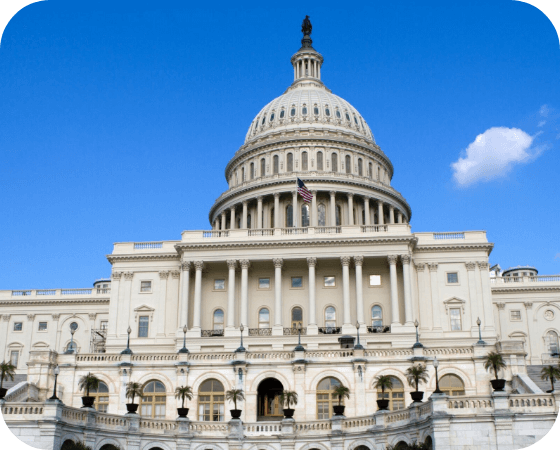Featured Blogs
The House Energy and Commerce Oversight Subcommittee held a hearing on Medicare physician payments under MACRA, focusing on MIPS, APMs, and their impact on small, independent doctors and rural areas.

After two tumultuous weeks dominated by historic trials, reactions to an Israeli hostage recuse mission, and a visit to Capitol Hill by former President Trump, this week looks to be a lot quieter. But looks can be deceiving, and things are always going on behind the scenes in this town if you know where to look. So, let’s get to it. Welcome to the Week Ahead!
The Administration
OMB on the Clock to Review DEA Rule on Prescribing Controlled Substances Via Telehealth
The Office of Management and Budget (OMB) has received a proposed rule from the Drug Enforcement Agency (DEA) that would allow individuals to be prescribed certain controlled substances from a practitioner utilizing telehealth even if they had not had an in-person evaluation from the practitioner. The proposed rule would only apply to non-narcotic schedule III-V controlled medications when certain circumstances are met.
The DEA currently has temporary telehealth flexibilities in place through the end of the year. If the agency does not finalize its proposed rule before then, patient advocates argue that those who have been utilizing the flexibilities will face barriers to prescriptions for conditions such as ADHD.
The Senate
Senate Finance Chair Readies Rural Maternal Health Bill
Senate Finance Committee Chair Ron Wyden (D-OR) announced on June 14 that he will be holding a press call on June 17 to preview legislation he plans to introduce to address concerns about the availability of maternal health services in rural areas. The press call is scheduled for 2 PM EST.
Both rural and maternal health care are areas with huge potential for bipartisanship. But the devil is in the details…
While the House is Away the Senate will Play…Detective
What do you do if you’re in the Senate, but the House is out of session? Of course, you can vote on nominations. But It’s a lot more fun to hold investigations on hot button issues that are sure to make headlines. We are tracking a couple of such investigations in 2 committees this week.
- Senate Health, Education, Labor, and Pensions (HELP) Committee
- o Chair Bernie Sanders (I-VT)was ready to hold a vote to subpoena Novo Nordisk’s President of North American Operations to testify about the company’s pricing of Ozempic and Wegovy in the United States.
- However, Chair Sanders dropped his threat after the company’s global CEO Lars Fruergaard Jørgensen said he will testify at a hearing scheduled for September, according to Inside Health Policy.
- This sets the stage for a potentially dramatic hearing 2 months before the 2024 elections.
- But Novo Nordisk is not out of the woods yet, because the HELP Committee is still scheduled to vote to authorize an investigation into the company at a hearing scheduled for June 18.
- Senate Homeland Security and Governmental Affairs Committee (HSGAC)
- HSGAC is scheduled to hold a hearing on the origins of the COVID-19.
- We’ve seen a lot of action on this issue in the House Oversight Committee, with Republicans and Democrats often disagreeing about what the focus of those efforts should be (even issuing conflicting reports).
- But this is the Senate. And the Senate is controlled by Democrats. Will we see bipartisan agreement about needed actions to understand the origins of COVID-19, unlike the partisan outcomes of the House hearings?
The House
The Ways to End a Month and What it Means
The House is in recess, so we are looking ahead to when they return. As we wait, we are tracking rumors that the Ways and Means Committee may be planning a markup related to innovation and medical coverage issues.
So What?
After July ends, we go to August recess and the unofficial final push to the November elections. As that date gets closer, many members of Congress will start having more things to do outside of Washington (and we are not talking about field hearings). These rumored hearings might be some of the last ones we see from the committee until after the elections or even until after the end of the year.
There You Have It
One of the reasons this week is so quiet is because Wednesday, June 19 is Juneteenth, the federal holiday that marks the date when the news of emancipation reached slaves in Texas in 1865. As we take time to celebrate this important date, we look back on progress so far and recognize the work that still needs to be done to form a more perfect union with liberty and justice for all. Make it a great week!

Not two weeks have passed since the historic felony conviction of former President Trump, and now we could be heading towards another historic felony conviction, this time for Hunter Biden, the son of the current president. If these last few weeks have shown us anything, they show us that history stops for no one. So, let’s get to it. Welcome to the Week Ahead!
The Administration
JUUL Catches a Break from FDA
The Food and Drug Administration (FDA) statswork.com) ” href=”https://nam10.safelinks.protection.outlook.com/?url=https%3A%2F%2Fpolicycrush.us4.list-manage.com%2Ftrack%2Fclick%3Fu%3D376b597042727023b90a0d75c%26id%3D3092f83419%26e%3D765e242272&data=05%7C02%7Ctashi%40chamberhill.com%7Cba03d0c431624a3a346a08dc89575ef8%7C88aa046a655e4b09a66d2b5a1e19609a%7C0%7C0%7C638536255571213166%7CUnknown%7CTWFpbGZsb3d8eyJWIjoiMC4wLjAwMDAiLCJQIjoiV2luMzIiLCJBTiI6Ik1haWwiLCJXVCI6Mn0%3D%7C0%7C%7C%7C&sdata=7JYtVGlbFjTM17Yx6T%2B0kTSOQV2SiPKFQOAoqjXJvmM%3D&reserved=0″ target=”_blank” rel=”noopener noreferrer” data-auth=”Verified” data-linkindex=”0″>announced the agency is rescinding its marketing denial orders (MDOs) against JUUL Labs, Inc. tobacco products, including e-cigarettes on June 6. These MDOs, issued on June 23, 2022, called for JUUL tobacco products to be removed from the market. Weeks later, FDA issued an administrative stay on the MDOs on July 5, 2022, because “certain scientific issues warranted additional review.” In its June 6 update, FDA cited this review and recent court decisions as the basis for the recession. The agency was clear in its announcement that the decision is not an authorization or denial of JUUL’s marketing applications and that the applications are once again under review.
JUUL wasted no time in celebrating the announcement and noted that JUUL products would be on the market during the review process.
Now What?
- Health advocacy groups, such as the American Lung Association and the Campaign for Tobacco-Free Kids, expressed disappointment regarding the decision. What next steps will they take to pressure the FDA to pull JUUL products from the market?
- What will congressional opponents of e-cigarettes do in response to this decision? Appropriations season is underway, and opponents could use funding legislation to direct or block agency action.
Save the Date: June 20 is when the Supreme Court is scheduled to hear a request from the FDA to overrule a previous court ruling that found FDA had to consider applications for e-cigarettes one at a time, and could not just reject all of them, according to Inside Health Policy.
The Senate
Stillbirth Prevention Act up for UC?
We are hearing that the Senate could move by unanimous consent to pass H.R.4581, Maternal and Child Health Stillbirth Prevention Act of 2024. This bill would allow Maternal and Child Health Services Block Grant funds to be used for stillbirth research and prevention activities. Since this bill has already passed the House, the bill would go to the President’s desk if passed.
But this bill isn’t out of the woods yet. The UC process is dicey because a single senator can stop the process at any point. Senators have been known to block bills even if they agree with the underlying premise but have another issue (i.e. procedural concerns, concerns about related bills not getting a vote).
Health Care Hearings in the Senate
- June 12: Senate Finance Committee hearing on youth residential treatment facilities
- June 12: Senate Judiciary Committee hearing on youth vaping
The House
E&C Mark-Up Watch
What we are hearing: The House Energy and Commerce is expected to put out a notice of a mark-up on June 12 of several health care bills. These bills could be on a range of different topics, but we expect them to be non-controversial.
Just because these bills are non-controversial does not mean they are insignificant. Even bills that may not produce rage-inducing headlines can still involve significant appropriations in public health programs and major changes to the health care system. Plus, those non-controversial bills have the best shot of becoming law. Speaking of which…
Health Care Week?
Just when we thought bipartisanship was dead, rumors of a bipartisan “health care week in the House” keep hopes alive. This rumored health care week would most likely occur in the second week of July and would be marked by votes on health care legislation. What bills would be included? Although we don’t know for sure, we bet that any bills coming out of that expected E&C markup would be prime contenders.
Now that we’ve talked about what might happen, here’s a look at the health care hearings in the House this week:
- The show-stopper will be CMMI Director Liz Fowler on the hot seat at the June 13 House Energy and Commerce Health Subcommittee hearing on the CMS Innovation Center. Director Fowler, a Hill alum, will try to defend the results-to-date of the evergreen funding the learning lab received from the ACA.
- June 13: House VA Committee hearing on spinal cord injuries and disorders in the veteran community
- June 13: House Budget Committee hearing on Medicare and Social Security
There You Have It
Flag Day is June 14! Check out these interesting facts about Flag Day. Let us know if you know any other fun facts about the Stars and Stripes. Make it a great week!

Donald Trump made history on May 30 as the first former President to be convicted of a felony. Congress now returns for the first time since that conviction, and many lawmakers will be focusing their attention on the fallout from the verdict. We won’t add to the pile of punditry that has already been printed but will instead focus on the latest health care policy news. Welcome to the Week Ahead!
The Administration
ACLA Tests the Legal Waters with LDT Lawsuit
As the former president prepares his appeal, the Food and Drug Administration (FDA) is preparing for a legal fight of its own. On May 29, the American Clinical Laboratory Association (ACLA) announced it was filing a lawsuit against the FDA to stop the agency’s Final Rule to regulate laboratory-developed tests (LDTs) as medical devices. The ACLA argues that Congress never gave the FDA the authority to regulate these tests.
So what? The lawsuit is just the latest effort by the ACLA to stop this rule from going into effect. We expect the lab industry to follow the lawsuit with increased lobbying. Some Republicans on the House Energy and Commerce Committee have expressed concerns about potential unintended consequences from the rule, but what will become of efforts to pull back the rule?
Senate
Multiplan Madness
Senate Finance Committee Chair Wyden (D-OR) and Senate HELP Committee Chair Sanders (I-VT) are looking to get answers from Mutliplan regarding concerns about certain practices the company uses when negotiating out-of-network payment rates for insurers. Specifically, the Senators are concerned these practices increase costs for patients and may be allowing insurers to skimp on fulfilling their obligations to patients. They requested a response by June 5. Here are some things to watch for:
- Will the two Democratic chairs get any help from their GOP Ranking Members?
- Will we see any corresponding action in the House?
Senate Health Care Hearings
- June 4: Senate HELP Committee hearing on the Impact of Abortion Bans on Women’s Health
- June 5: Senate Special Committee on Aging and Senate VA Committee hearing on Services for Veterans and Their Caregivers
The House
Checking in with Ways and Means
Work continues behind the scenes at the House Ways and Means Committee on provisions that could find their way in a late year, post-election health care package:
- Telehealth: It sounds like a 2-year extension of telehealth flexibilities is picking up steam and is likely before year’s end. While advocates would love action before the November elections, it’s unclear at best if Congress can agree on addressing the issue sooner than December.
- Rural health: In addition to the bills passed out of the Committee at its May 8 markup, the Committee is hoping to move additional rural bills before summer’s end. Any measures cleared by the Committee will be in play to move in a larger health package during the lame duck session.
- Medicare physician payment: With Congress waiting for the release of the Medicare physician fee schedule in late June, it’s hard to see any significant movement on Medicare payment legislation before the election. In addition, word is that there is growing interest among policymakers in H.R. 6371, the Provider Reimbursement Stability Act, which would address Medicare’s budget neutrality requirement.
House Health Care Hearings
- June 3: House Oversight and Accountability Select Subcommittee on the Coronavirus Pandemic hearing with Dr. Fauci
- June 4: House Energy and Commerce Oversight and Investigations Subcommittee hearing on 340B Drug Pricing Program
- June 4: House Natural Resources legislative hearing, including H.R. 6395, Recognizing the Importance of Critical Minerals in Healthcare Act of 2023
There You Have It
Summer is officially here! Have any big summer travel plans? Favorite summer- time activities? Let us know! Make it a great week!





